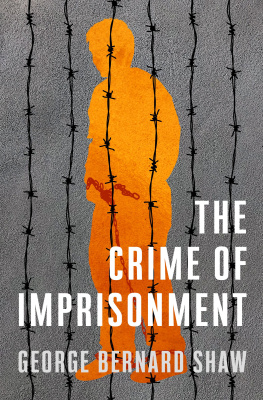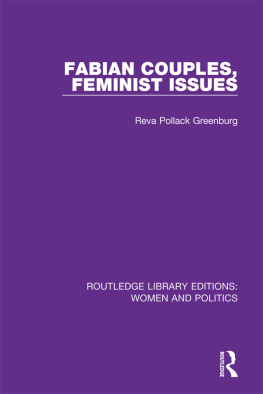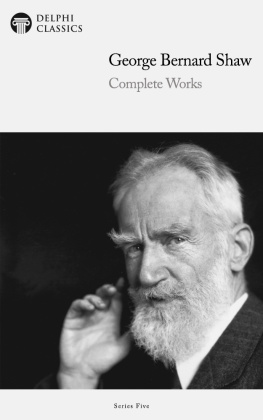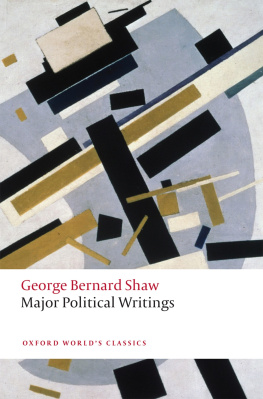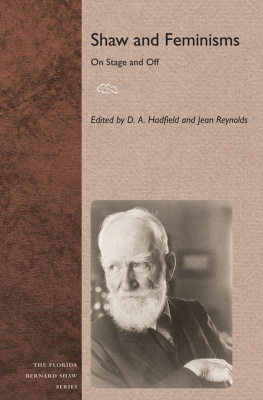The Feminist Shaw Shaw and the Contemporary Literary Theories of Feminism
This book takes us through the life and works of George Bernard Shaw as a feminist. It critically explores his major plays to showcase how his works discuss ideas, practices, discourses, and ideologies that are considered to be antecedents to the modern feminist movements.
While the involvement of male feminists in feminist movements prior to the twentieth century were sporadic, isolated, and relatively unconnected, Shaw used the dramatic form of realistic theatre to communicate socialist and feminist ideas to his contemporary audience. The volume sheds light on how Shaw in his plays and prefaces exposes the iniquities suffered by women. His women characters do not conform to the Victorian notions of femininity; voice self-awareness, self-evaluation, and realisation of personal worth; and break free from the typical mythical representation in literature, to pave the way for the future generations of female character. Shaws women break the stereotypes of Victorian society to voice and follow their dreams and desires without the fear of societal sanction. Through selections from texts such as Back to Methuselah, Pygmalion, Candida, Arms and the Man, Saint Joan, Mrs. Warrens Profession, Man and Superman, The Black Girl in search of God, and The Simpleton of the Unexpected Isles, this book highlights how Shaw gave the world ideologies that have since been adapted by the second- and third-wave feminists.
Foregrounding Shaws critical role in strengthening feminist characters in modern literature, this volume will be of great interest to scholars and researchers of literature and literary criticism, theatre studies, feminism, freudian studies and gender studies.
Nishtha Mishra has a PhD in English Literature, from the University of Allahabad, India. She has received the UGC PG Rank Holder Fellowship for University Rank Holders (201113), and has received gold medals for academic excellence at graduate and post-graduate levels. She has formerly worked as Guest Faculty at the University of Allahabad, India from July 2016 to April 2020. She is a published author of two anthologies of poems, a collection of biographies, and several international research papers, while two of her books are currently under publication. Apart from this, her articles and poems have also been published in leading Indian dailies like Hindustan Times and JagMarg.
The Feminist Shaw
Shaw and the Contemporary Literary Theories of Feminism
Nishtha Mishra
First published 2022
by Routledge
2 Park Square, Milton Park, Abingdon, Oxon OX14 4RN
and by Routledge
605 Third Avenue, New York, NY 10158
Routledge is an imprint of the Taylor & Francis Group, an informa business
2022 Nishtha Mishra
The right of Nishtha Mishra to be identified as author of this work has been asserted in accordance with sections 77 and 78 of the Copyright, Designs and Patents Act 1988.
All rights reserved. No part of this book may be reprinted or reproduced or utilised in any form or by any electronic, mechanical, or other means, now known or hereafter invented, including photocopying and recording, or in any information storage or retrieval system, without permission in writing from the publishers.
The views and opinions expressed in this book are those of author and do not necessarily reflect the views and opinions of Routledge.
Trademark notice: Product or corporate names may be trademarks or registered trademarks, and are used only for identification and explanation without intent to infringe.
British Library Cataloguing-in-Publication Data
A catalogue record for this book is available from the British Library
Library of Congress Cataloging-in-Publication Data
A catalog record has been requested for this book
ISBN: 978-0-367-21074-8 (hbk)
ISBN: 978-1-032-16195-2 (pbk)
ISBN: 978-0-429-28044-3 (ebk)
DOI: 10.4324/9780429280443
Typeset in Sabon
by SPi Technologies India Pvt Ltd (Straive)
Dedicated to my parents
Dr. Gauri Shankar Mishra and Prof. Usha Mishra
Preface
In the year 2011, contemporary feminist Germaine Greer stated that from the point of view of present-day feminists, George Bernard Shaw is less irreverent than irrelevant, to which Philip Graham had replied that no matter how categorically Shaw is ignored in the feminist quest of obtaining a monopoly over a literature of ones own, Shaw remains a positive influence. In addition, Shaws discussions of choices placed before his female protagonists were rendered anti-feminist by many recent researches. This has been the point from where this book takes one forward to reposition Shaw as a feminist who had been responsible for the latent wave of Shavian Feminism.
David Clare in his review of the most recent volume of Shaw and Feminisms: On Stage and off (2013), has mentioned that: A final reservation regarding this volume is the fact that it does not engage enough with contemporary feminist theory a clear part of its implied remit in following on from Fabian Feminist. This book attempts to overcome this flaw in Shavian studies by showing methodically, through deconstruction, structural and discourse analysis, that Shaw not only connects the ideology of first-wave feminism with the second as a bridge, but also serves as a flyover diverting the excess of traffic of second-wave feminism and directly connecting the first wave to the third.
This book includes biographical details by some of his renowned biographers and autobiographical insights by Shaw to show the various influences on his work from the Oriental world. As such, this book can also be an important source for post-colonial studies. This book discusses the context of certain plays by Shaw with reference to many contemporary theories of literary criticism, including archetypal criticism, psychoanalytic criticism, ecofeminism, Marxist feminism, Black feminism, Islamic feminism, and LGBTQ theory. It also recognises the gaps in the existing feminist treatise and shows how Shaws discussion plays have already addressed those gaps.
With all my sincerity, I feel deeply indebted to my DPhil. supervisor, Prof. Gunjan Sushil, for her guidance, feedback and suggestions. It is due to her constant encouragement and support that the timely completion of my work became possible. Her encouragement inspired me to probe further into the details of various movements and theories in literature. I am grateful to Prof. Lakshmi Raj Sharma for believing in my potential throughout my work and for his expert comments and guidance.
I would like to express my gratitude to all the faculty members of the Department of English and Modern European Languages, University of Allahabad for their encouragement, help and unfailing support throughout my DPhil. research work on George Bernard Shaw, which ultimately initiated the idea of this book. I express my gratefulness to the staff of the Departmental Library and the Central Library, University of Allahabad for their contribution in providing access to study material online and in print. A great deal of thanks is owed to the Centre for Women Studies, University of Allahabad for giving an insightful training through their course on Understanding Gender. I am hugely indebted to Prof. P. C. Saxena for donating his rich collection of George Bernard Shaws work to me making giving me access to almost all the primary resources.



